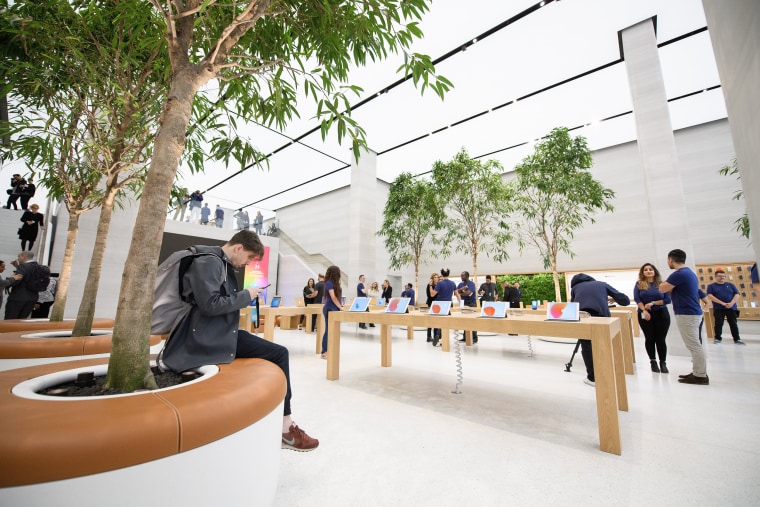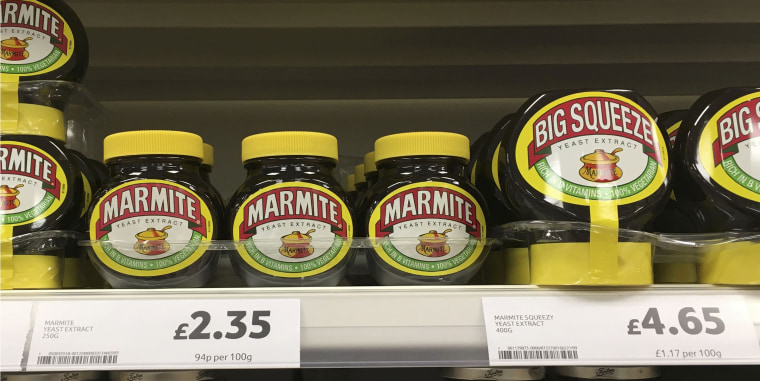LONDON — Brexit is beginning to hit British consumers in their wallets.
Since the June 23 vote to leave the European Union, the value of the pound has dropped by about 18 percent against the dollar and the euro, sending the price of imported goods skyrocketing.
There is evidence that large and small retailers are beginning to pass those higher costs onto their customers.
Apple has raised its prices while Toblerone shrunk the size of some of its chocolate products. Others are simply pleading with their customers to buy more of their products in exchange for creative promises — like mooning Boris Johnson, the U.K.’s foreign secretary and a leading campaigner for Brexit — if sales increase.
There is a lot of uncertainty over what exactly happens next on Brexit, especially after a Nov. 3 court ruling that Britain's government can't trigger the process of withdrawal from the European Union without approval from parliament. The government promised to appeal the move.
But the drop in the value of the pound is indisputable and it is already having an impact on retailers.
"We are in danger of disappearing because of this stupid vote"
“Brexit is breaking us. Without going into too many commercial details, our print costs have almost tripled since we set up four years ago. Mainly, this is thanks to the beating that the pound has taken," Galley Beggar Press, an independent publisher, wrote in a newsletter to customers as it pleaded for them to buy more books.
The cost to print books has jumped from £1.50 ($1.86) per unit to over £3.00 ($3.72) per unit since June, according to Sam Jordison, the 39-year-old co-director of Galley Beggar Press. He says that printing has become so expensive because everything is imported.
“We are prestigious book publishers. We win a lot of prizes and sell a lot of books abroad. We are good for the U.K., but we are in danger of disappearing because of this stupid vote,” a clearly frustrated Jordison said in a phone interview.
The Nov. 8 newsletter had a postscript: “If we make an extra £1,000 [$1,239] by the end of this week, I promise to find Boris Johnson, moon him and roundly call out insults like it's the 16th century.”
Related: Brexit Storm Clouds Gather Over Sunny U.K. Outpost
The newsletter appeal got a “fantastic” response with a surge in sales and Jordison is now in “mooning Boris Johnson mode.”
The company might have gotten a short-term boost to its finances and morale, but long-term uncertainty about Brexit will continue to be a problem. Jordison says he will probably have to raise prices next. But his “ultimate plan is to move to Canada!”
From computers to candy bars
Galley Beggar Press may be small-scale, but they are suffering from the same problems as major retailers like Apple, Microsoft and Electrolux.
Apple quietly raised the prices on its iPhones, iPads and MacBooks for its British customers at the end of October by about 20 percent. For instance, if a customer buys a MacBook in the U.S., the base price is $1,299; the same product in the U.K. retails for £1,249 or $1,575.

Likewise, Microsoft announced that it will be increasing costs for customers buying enterprise software and cloud services in British pounds by 13 to 22 percent in order to “harmonize prices” within the EU region as of January 1, 2017.
The home appliance company, Electrolux, also announced that it will be hiking prices on some of its products by 10 percent.
But it’s not just big ticket items like computers and smartphones that are getting more expensive — basic food items are, too.

“Marmageddon” became the nickname for an unusually public spat between two huge players in the grocery business — Tesco, a British supermarket giant, and Unilever, a major supplier of products.
When Tesco refused to accept price hikes on hundreds of Unilever products, Marmite — a popular sticky, dark brown spread — vanished from its supermarket shelves.
But then a smaller chain, Morrisons, gave in and the price of Marmite rose by 12.5 percent.
The issue became such a symbol of the fears of widespread price hikes post-Brexit that it inspired its own Twitter hashtag #Marmageddon.
The potato chip maker, Walkers, and frozen food company, Birds Eye, have also announced that they will have to increase their prices because of the poor exchange rate. For example, a small bag of Walkers potato chips will go up in price from 63 cents to 69 cents.
Not everyone believes that at the end of the day British consumers will really bear the brunt of the rising costs. Independent retail analyst Richard Hyman took a contrarian view and believes that fierce competition among large retailers to sell cheap products will keep prices down.
“Don’t be fooled, there is not going to be a lot of price inflation in U.K. retail,” Hyman said in a phone interview.
He argued that most large retailers have hedges for currency inflation and that when they start feeling the pinch, they will do whatever they can to cut costs in other ways — like cutting jobs.
“In order to make a profit, you have to make a sale,” Hyman reasoned.
Still, the U.K.’s Consumer Prices Index rose by 1.0 percent in the year to September, according to the Office for National Statistics — the highest rate of inflation since November 2014. This fueled analysts' concerns that the overall rate of inflation could jump in the coming year.
But for many Brits who aren't watching official statistics, the fact that Toblerone changed shrunk its iconic triangular chocolate bars because of higher costs was the final straw.
'Working for nothing'
But the challenges of increasing prices on customers can feel personal for small-scale retailers, like Kitchen8, which sells fresh lunch to workers in Central London. All of the vegetables it uses in salads are imported and their costs have gone up by 30 to 40 percent, according to the shop’s owner, Sorin Baranga.
“We tried to wait longer to rise prices, but we can’t, we’re working for nothing,” said the 41-year-old, who started his business five years ago.
On Monday, the shop posted a note next to the cash register saying: “We have held off as long as possible in an effort to understand the longer-term impact of pricing post Brexit referendum. However, due to further devaluation of the GDP in the past two months we are unable to hold on to our current pricing.” Kitchen8 raised the cost of a salad to $6.31 from $5.68.
Baranga said it was a “really hard decision” to raise the prices for his customers, “but we can’t continue like this.”
